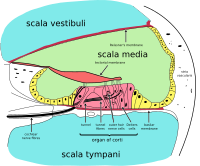
Photo from wikipedia
Introduction The auditory system of HIV-positive children may have deficits at various levels, such as the high incidence of problems in the middle ear that can cause hearing loss. Objective The objective… Click to show full abstract
Introduction The auditory system of HIV-positive children may have deficits at various levels, such as the high incidence of problems in the middle ear that can cause hearing loss. Objective The objective of this study is to characterize the development of children infected by the Human Immunodeficiency Virus (HIV) in the Simplified Auditory Processing Test (SAPT) and the Staggered Spondaic Word Test. Methods We performed behavioral tests composed of the Simplified Auditory Processing Test and the Portuguese version of the Staggered Spondaic Word Test (SSW). The participants were 15 children infected by HIV, all using antiretroviral medication. Results The children had abnormal auditory processing verified by Simplified Auditory Processing Test and the Portuguese version of SSW. In the Simplified Auditory Processing Test, 60% of the children presented hearing impairment. In the SAPT, the memory test for verbal sounds showed more errors (53.33%); whereas in SSW, 86.67% of the children showed deficiencies indicating deficit in figure-ground, attention, and memory auditory skills. Furthermore, there are more errors in conditions of background noise in both age groups, where most errors were in the left ear in the Group of 8-year-olds, with similar results for the group aged 9 years. Conclusion The high incidence of hearing loss in children with HIV and comorbidity with several biological and environmental factors indicate the need for: 1) familiar and professional awareness of the impact on auditory alteration on the developing and learning of the children with HIV, and 2) access to educational plans and follow-up with multidisciplinary teams as early as possible to minimize the damage caused by auditory deficits.
Journal Title: International Archives of Otorhinolaryngology
Year Published: 2017
Link to full text (if available)
Share on Social Media: Sign Up to like & get
recommendations!